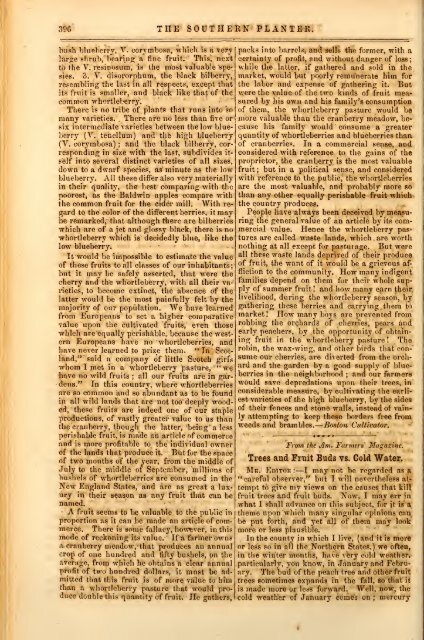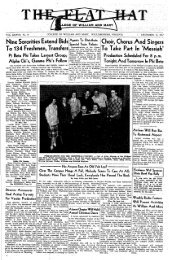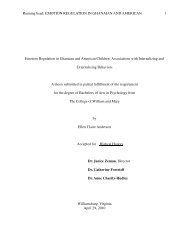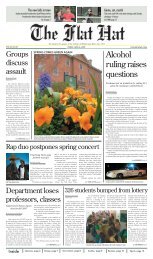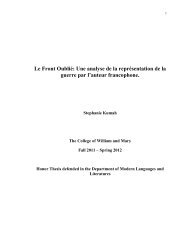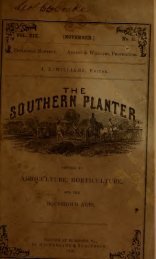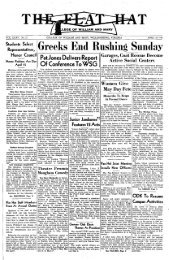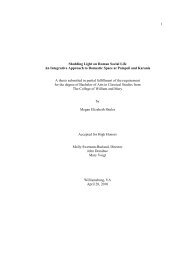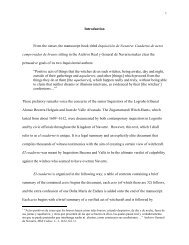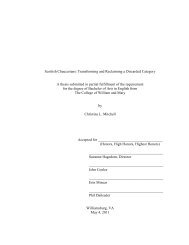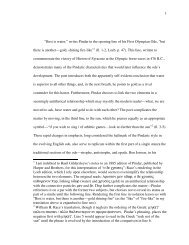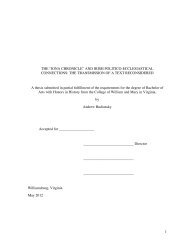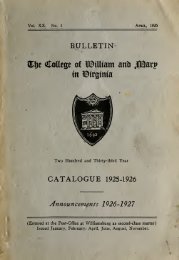Southern planter : devoted to agriculture, horticulture, and the ...
Southern planter : devoted to agriculture, horticulture, and the ...
Southern planter : devoted to agriculture, horticulture, and the ...
Create successful ePaper yourself
Turn your PDF publications into a flip-book with our unique Google optimized e-Paper software.
"bush bhielierry, V. corymbosn, vrhich is a very<br />
large shrub, benrinp; a fine fruit. This, next<br />
<strong>to</strong> <strong>the</strong> V. resinosum, is <strong>the</strong> most valuable spesies,<br />
3. V. disororphum, <strong>the</strong> black bilberry,<br />
resembling <strong>the</strong> last in all respects, except that<br />
its fruit is smaller, <strong>and</strong> black like that of <strong>the</strong><br />
common whortleberry'.<br />
There is no tribe of plants that runs in<strong>to</strong> so<br />
many varieties. There are no less than five or<br />
six intermediate varieties betvreen <strong>the</strong> low blueberry<br />
(Y. tencllum) <strong>and</strong> <strong>the</strong> high blueberry<br />
(V. corymbosa) ; <strong>and</strong> <strong>the</strong> black bilberry, corresponding<br />
in size with <strong>the</strong> last, subdivides it-<br />
self in<strong>to</strong> several distinct varieties of all sizes,<br />
down <strong>to</strong> a dwarf species, as minute as <strong>the</strong> low<br />
blueberry. All <strong>the</strong>se differ also very materially<br />
in <strong>the</strong>ir quality, <strong>the</strong> best comparing with <strong>the</strong><br />
poorest, as <strong>the</strong> Baldwin apples compare with<br />
<strong>the</strong> common fruit for <strong>the</strong> cider mill. With regard<br />
<strong>to</strong> <strong>the</strong> color of <strong>the</strong> different berries, it may<br />
be remarked, that although <strong>the</strong>re are bilberries<br />
which are of a jet <strong>and</strong> glossy black, <strong>the</strong>re is no<br />
whortleberry which is decidedly blue, like <strong>the</strong><br />
low blueberry.<br />
It would be impossible <strong>to</strong> estimate <strong>the</strong> value<br />
of <strong>the</strong>se fruits <strong>to</strong> all classes of our inhabitants;<br />
but it may be safely asserted, that were <strong>the</strong><br />
cherry <strong>and</strong> <strong>the</strong> whortleberry, with all <strong>the</strong>ir varieties,<br />
<strong>to</strong> become extinct, <strong>the</strong> absence of <strong>the</strong><br />
latter would be <strong>the</strong> most painfully felt by <strong>the</strong><br />
majority of our population. We have learned<br />
from Europeans <strong>to</strong> set a higher comparative<br />
value upon <strong>the</strong> cultivated fruits, even those<br />
which are equall^^ perishable, because <strong>the</strong> western<br />
Europeans have no whortleberries, <strong>and</strong><br />
have never learned <strong>to</strong> prize <strong>the</strong>m. " In Scot-<br />
THE SOUTHERN PLANTER.<br />
l<strong>and</strong>,'' said a company of little Scotch girls<br />
whom I met in a whortleberry pasture, " we<br />
have no wild fruits ; all our fruits are in gardens."<br />
In this country, where whortleberries<br />
are so common <strong>and</strong> so abundant as <strong>to</strong> be found<br />
in all wild l<strong>and</strong>s that are not <strong>to</strong>o deeply wooded,<br />
<strong>the</strong>se fruits are indeed one of our staple<br />
productions, of vastly greater value <strong>to</strong> us than<br />
<strong>the</strong> cranberry, though <strong>the</strong> latter, being' a less<br />
perishable fruit, is made an article of commerce<br />
<strong>and</strong> is more profitable <strong>to</strong> <strong>the</strong> individual owner<br />
of <strong>the</strong> l<strong>and</strong>s that produce it. But for <strong>the</strong> space<br />
of two months of <strong>the</strong> year, from <strong>the</strong> middle of<br />
July <strong>to</strong> <strong>the</strong> middle of September, millions of<br />
bushels of whortleberries are consumed in <strong>the</strong><br />
New Engl<strong>and</strong> States, <strong>and</strong> are as great a luxury<br />
in <strong>the</strong>ir season as any fruit that cun be<br />
named.<br />
A fruit seems <strong>to</strong> be valuable <strong>to</strong> <strong>the</strong> public in<br />
proportion as it can be made an article of commerce.<br />
There is some fallac}^ ho\v^ver, in this<br />
mode of reckoning its value. If a farmer owns<br />
a cranberry meadow, that produces an annual<br />
crop of one hundred <strong>and</strong> fifty bushels, on <strong>the</strong><br />
average, from wliich he obtains a clear annual<br />
profit of two hundred dollars, it must be admitted<br />
that this fruit is of more value <strong>to</strong> him<br />
than a whortleberry pasture that would produce<br />
double this quiintity of fruit. lie ga<strong>the</strong>rs,<br />
packs in<strong>to</strong> barrels, <strong>and</strong> sells <strong>the</strong> former, with a<br />
certainty of profit, <strong>and</strong> without danger of loss;<br />
while <strong>the</strong> latter, if ga<strong>the</strong>red <strong>and</strong> sold in <strong>the</strong><br />
market, would but poorly remunerate him for<br />
<strong>the</strong> labor <strong>and</strong> expense of ga<strong>the</strong>ring it. But<br />
were <strong>the</strong> value of <strong>the</strong> two kinds of fruit measured<br />
by his own <strong>and</strong> his family's consumption<br />
of <strong>the</strong>m, <strong>the</strong> whortleberry pasture would be<br />
more valuable than <strong>the</strong> cranberry meadow, because<br />
his family would consume a greater<br />
quantity of whortleberries <strong>and</strong> blueberries than<br />
of cranberries. In a commercial sense, <strong>and</strong><br />
considered with reference <strong>to</strong> <strong>the</strong> gains of <strong>the</strong><br />
proprie<strong>to</strong>r, <strong>the</strong> cranberry is <strong>the</strong> most valuable<br />
fruit ; but in a political sense, <strong>and</strong> considered<br />
with reference <strong>to</strong> <strong>the</strong> public, <strong>the</strong> whortleberries<br />
are <strong>the</strong> most valuable, <strong>and</strong> probably more so<br />
than any o<strong>the</strong>r equally perishable fruit which.<br />
<strong>the</strong> country produces.<br />
People have always been deceived by measuring<br />
<strong>the</strong> general value of an article by its com-<br />
mercial value. Hence <strong>the</strong> whortleberry pas-<br />
tures are called waste l<strong>and</strong>s, which . are worth<br />
nothing at all except for pasturage. But were<br />
all <strong>the</strong>se waste l<strong>and</strong>s deprived of <strong>the</strong>ir produce<br />
of fruit, <strong>the</strong> want of it would be a grievous affliction<br />
<strong>to</strong> <strong>the</strong> community. How many indigent<br />
families depend on <strong>the</strong>m for <strong>the</strong>ir whole supply<br />
of summer fruit I <strong>and</strong> how many earn <strong>the</strong>ir<br />
livelihood, during <strong>the</strong> whortleberry season, by<br />
ga<strong>the</strong>ring <strong>the</strong>se berries <strong>and</strong> carrying <strong>the</strong>m <strong>to</strong><br />
market! How many boys are prevented from<br />
robbing <strong>the</strong> orchards of cherries, pears <strong>and</strong><br />
early peachers, by <strong>the</strong> opportunity of obtaining<br />
fruit in <strong>the</strong> whortleberry pasture ! The<br />
robin, <strong>the</strong> wax-wing, <strong>and</strong> o<strong>the</strong>r birds that consume<br />
our cherries, are diverted from <strong>the</strong> orchard<br />
<strong>and</strong> <strong>the</strong> garden by a good suppl};- of blueberries<br />
in <strong>the</strong> neighborhood ; <strong>and</strong> our farmers<br />
would save depredations upon <strong>the</strong>ir trees, in<br />
considerable measure, by cultivating <strong>the</strong> earli-<br />
est varieties of <strong>the</strong> high blueberr}", by <strong>the</strong> sides<br />
of <strong>the</strong>ir fences <strong>and</strong> s<strong>to</strong>ne walls, instead of vainly<br />
attempting <strong>to</strong> keep <strong>the</strong>se borders free from<br />
weeds <strong>and</strong> brambles. Bos<strong>to</strong>n Callivoior.<br />
From <strong>the</strong> Ayn. Farmers' Mas^azine.<br />
Trees <strong>and</strong> Fruit Buds vs. Cold Water.<br />
Mr. Edi<strong>to</strong>k :—I may not be regarded as a<br />
" careful observer," but I will never<strong>the</strong>less attempt<br />
<strong>to</strong> give my views on <strong>the</strong> causes that kill<br />
fruit trees <strong>and</strong> fruit buds. Now, I may err in<br />
what I shall advance on this subject, for it is a<br />
<strong>the</strong>me upon which many singular opinions can<br />
be put forth, <strong>and</strong> yet all of tbera may look<br />
more or less plausible.<br />
In <strong>the</strong> county in which I live, (<strong>and</strong> it is more<br />
or less so in all <strong>the</strong> Nor<strong>the</strong>rn States,) we often,<br />
in <strong>the</strong> winter months, have very cold wea<strong>the</strong>r,<br />
particularly, you know, in January <strong>and</strong> February.<br />
The bud of <strong>the</strong> peach tree <strong>and</strong> o<strong>the</strong>r fruit<br />
trees sometimes exp<strong>and</strong>s in <strong>the</strong> fall, so that it<br />
is made more or less forward. Well, now, <strong>the</strong><br />
cold wea<strong>the</strong>r of January comes on ; mercury


